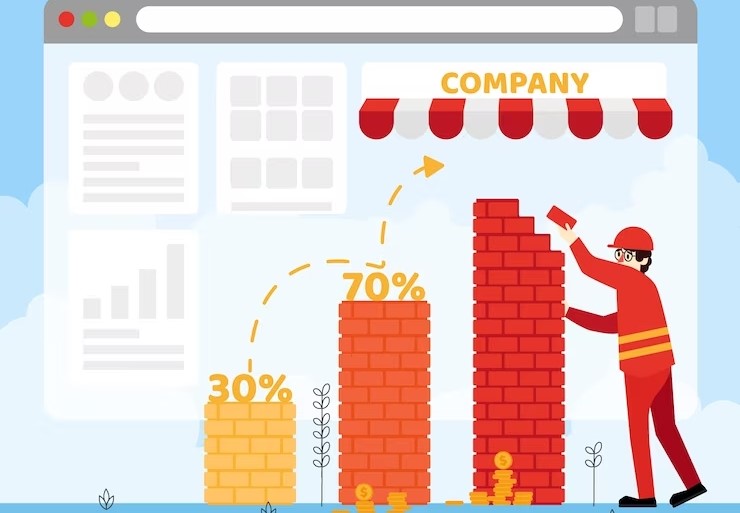


In the modern digital age, the importance of website and web development for small businesses cannot be overstated. A well-designed and properly optimized website serves as the digital storefront of a small business, making it accessible to a global audience 24/7. It provides a platform for showcasing products or services, disseminating crucial information, and establishing credibility in the eyes of potential customers.
A professionally developed website not only enhances a business's online presence but also improves discoverability through search engines, driving organic traffic. Furthermore, it enables businesses to engage with their audience, gather valuable customer data, and even facilitate e-commerce transactions, expanding revenue streams. In essence, website and web development empower small businesses to compete in the digital marketplace, foster customer trust, and unlock growth opportunities that were once unimaginable in a purely brick-and-mortar context. Thus, investing in a well-structured online presence through web development is not just an option but a strategic necessity for the success and sustainability of small businesses in today's interconnected world.
Determining how much to charge for building a website for a small business can vary widely depending on several factors. Here are some key considerations to help you arrive at an appropriate pricing structure:
Understand the specific requirements of the small business. Are they looking for a basic informational website, an e-commerce site, a blog, or something more complex like a custom web application? The complexity of the project will greatly influence your pricing.
The complexity of the design and the features requested will also impact the cost. A simple, minimalist design will be less expensive than a highly customized, intricate design. Features such as online booking systems, e-commerce functionality, and user authentication will increase the project's complexity and cost.
Find out if the client will provide all the content (text, images, videos) or if you'll need to create or source it for them. Content creation can significantly increase the project cost.
Consider the project's timeline. If the client needs the website quickly, you may need to charge more for rushed work or prioritize it over other projects, potentially affecting your availability for other clients.
Your level of experience, expertise, and reputation in web development will also influence your pricing. More experienced developers can generally command higher rates.
Research the rates charged by other web developers in your area or in your niche. This will give you a sense of the prevailing market rates. Additional Services: Consider whether you'll be providing additional services such as ongoing maintenance, SEO optimization, or hosting. These can be offered as separate packages or bundled with the initial website development. Overhead Costs: Don't forget to account for your own overhead costs, including software licenses, hosting fees, and other tools you may need to complete the project.
Determine what profit margin you want to achieve. This is essential for running a sustainable business.
Have a conversation with the client about their budget. Understanding what they're willing to invest in their website will help you align your pricing with their expectations.
Consult with a legal professional to ensure your contracts are solid and that you're protecting yourself from potential scope creep or disputes.
Factor in some contingency for unforeseen issues or changes in project scope. It's a good practice to have a buffer in your pricing to handle unexpected situations.
Once you have a clear understanding of these factors, you can calculate a fair and competitive price for building the website. Be transparent with the client about your pricing structure, and provide a detailed proposal that outlines the scope of work, costs, and timelines. This will help build trust and set clear expectations from the beginning of the project.
The average cost of having someone build a website for you can vary significantly depending on factors such as the complexity of the site, the features you require, the designer or developer's experience, and your geographical location. In general, for a basic informational website, you might expect to pay anywhere from $1,000 to $5,000 or more. However, more complex websites with e-commerce functionality, custom designs, and advanced features can range from $5,000 to $20,000 or even higher. Ultimately, it's crucial to define your project's specific needs and budget constraints and then seek quotes from reputable web developers or agencies to get a more accurate estimate tailored to your requirements.
The fee for managing a website can vary based on several factors including the scope of management services, the size and complexity of the website, the frequency of updates, and your level of expertise. Generally, ongoing website management services can range from $50 to $150 per hour or more. For simpler websites that require routine updates, maintenance, and basic content management, a monthly retainer of $200 to $500 may be suitable. However, for more complex websites with regular content creation, SEO optimization, security monitoring, and e-commerce functionalities, monthly fees can be in the range of $500 to $1,500 or higher. It's important to discuss your client's specific needs and tailor your pricing accordingly, ensuring that it aligns with the value you provide and the market rates in your area.
